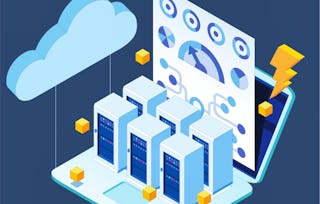Throughout this course, you'll explore virtualization, containerization, and Kubernetes, mastering the very tools that power data engineering in the industry. Each week presents a new set of tools and platforms that are indispensable in data engineering. From mastering Docker and Kubernetes to exploring advanced topics such as AI-driven coding with GitHub Copilot, efficient container image management with Azure and Amazon Elastic Container Registries, and Site Reliability Engineering (SRE) practices, you'll go beyond the basics and acquire the expertise needed to thrive in the dynamic and data-driven landscape of advanced data engineering. Whether you're a current student looking to expand your skills or a working professional aiming to take your expertise to the next level, this course is tailored to equip you with the advanced knowledge and hands-on experience necessary for success.

Virtualization, Docker, and Kubernetes for Data Engineering

Virtualization, Docker, and Kubernetes for Data Engineering
This course is part of Applied Python Data Engineering Specialization



Instructors: Noah Gift
Access provided by Abu Dhabi National Oil Company
6,135 already enrolled
46 reviews
Recommended experience
What you'll learn
Master virtualization, containerization, and Docker, including Dockerfile creation and multi-container orchestration with Compose and Airflow.
Develop expertise in Kubernetes core concepts, cluster architecture, and deployment using cloud environments, GitHub Codespaces, and AI-driven tools.
Navigate data scenarios mastering containerization, deploying apps, and addressing production issues with cloud orchestration and SRE practices.
Skills you'll gain
Details to know

Add to your LinkedIn profile
38 assignments
See how employees at top companies are mastering in-demand skills

Build your subject-matter expertise
- Learn new concepts from industry experts
- Gain a foundational understanding of a subject or tool
- Develop job-relevant skills with hands-on projects
- Earn a shareable career certificate

There are 4 modules in this course
In this module, you will learn about the fundamentals of virtualization, exploring its various aspects such as hardware utilization and scaling applications. You will start by understanding what virtualization is and delve into the concept of virtual machines. Through the introduction of Virtual Box and a hands-on demo, you will gain a practical understanding of how virtual machines work and their benefits. Additionally, you will explore container concepts, focusing on Docker as a key containerization tool. Through an introduction to Docker and its architecture, you will learn how to scale applications using containers, providing a comprehensive overview of virtualization and its practical applications. To apply your newfound knowledge, you will be assessed through a series of hands-on exercises involving the creation and management of virtual machines and containers, demonstrating your ability to effectively utilize virtualization technologies.
What's included
8 videos9 readings8 assignments1 discussion prompt
In this module, you will learn how to effectively work with the Docker client, create volumes, and run databases in containers, gaining hands-on experience in managing containerized applications. You will also explore how to use the Docker command line for tasks such as building images and working with Dockerfiles, enabling you to package your software efficiently. You'll get a chance to study real-life Dockerfile examples and consult the Dockerfile reference for best practices. Furthermore, you will dive into orchestration with Docker Compose, learning how to manage multi-container applications using Compose. As an extension to this, you will be introduced to Airflow, a workflow management platform, and learn how to integrate it with Docker Compose for a seamless automation experience.
What's included
9 videos6 readings8 assignments
In this module, you will embark on a comprehensive journey into Kubernetes, the cornerstone of modern container orchestration. You'll begin by grasping Kubernetes key concepts, cluster architecture, and service deployments. The advantages of cloud development environments, exemplified by GitHub Codespaces, will become more clear as you explore GitHub's ecosystem and harness AI-driven coding with GitHub Copilot and OpenAI Codewhisper. The module culminates in hands-on experience as you deploy Kubernetes using Minikube within GitHub Codespaces. Gain a solid foundation in Kubernetes essentials and the power of cloud-based development, setting the stage for successful containerized application management and collaborative coding in the modern era.
What's included
14 videos7 readings8 assignments
This module immerses you in the hands-on world of Kubernetes solutions. You'll start by mastering containerization, constructing FastAPI microservices, and deploying containerized applications using Azure Container Registry and Amazon Elastic Container Registry. Next, explore options for cloud-based container orchestration, featuring Google Cloud Run and AWS Copilot, and expand your coding horizons in AWS Cloud9. Finally, address critical production issues as you delve into load testing, monitoring systems, the SRE mindset for MLOps, and the art of operationalizing microservices. This module offers a comprehensive toolkit to navigate Kubernetes in real-world scenarios, combining theory and practice to prepare you for Kubernetes success.
What's included
13 videos8 readings14 assignments
Earn a career certificate
Add this credential to your LinkedIn profile, resume, or CV. Share it on social media and in your performance review.
Offered by
Why people choose Coursera for their career

Felipe M.

Jennifer J.

Larry W.

Chaitanya A.
Learner reviews
- 5 stars
52.17%
- 4 stars
13.04%
- 3 stars
13.04%
- 2 stars
8.69%
- 1 star
13.04%
Showing 3 of 46
Reviewed on Feb 18, 2024
It was great but the last module of week 4 felt isolated from the rest of the course.
Reviewed on Mar 19, 2025
For the first time I really understood what "virtualization" is and how things sort of expand for larger and larger units. Really solid stuff on CI/CD stuff also.
Explore more from Data Science

Duke University

Duke University



